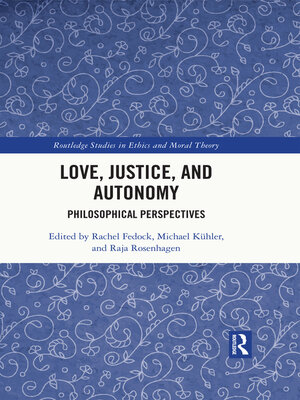Love, Justice, and Autonomy
ebook ∣ Philosophical Perspectives · Routledge Studies in Ethics and Moral Theory
By Rachel Fedock

Sign up to save your library
With an OverDrive account, you can save your favorite libraries for at-a-glance information about availability. Find out more about OverDrive accounts.
Find this title in Libby, the library reading app by OverDrive.



Search for a digital library with this title
Title found at these libraries:
| Library Name | Distance |
|---|---|
| Loading... |
Philosophers have long been interested in love and its general role in morality. This volume focuses on and explores the complex relation between love and justice as it appears within loving relationships, between lovers and their wider social context, and the broader political realm. Special attention is paid to the ensuing challenge of understanding and respecting the lovers' personal autonomy in all three contexts.
Accordingly, the essays in this volume are divided into three thematic sections. Section I aims at shedding further light on conceptual and practical issues concerning the compatibility or incompatibility of love and justice within relationships of love. For example, are loving relations inherently unjust? Might love require justice? Or do love and justice belong to distinct moral domains? The essays in Section II consider the relation between the lovers on the one hand and their broader societal environment on the other. Specifically, how exactly are love and impartiality related? Are they compatible or not? Is it unjust to favor one's beloved? Finally, Section III looks at the political dimensions of love and justice. How, for instance, do various accounts of love inform how we are to relate to our fellow citizens? If love is taken to play an important role in fostering or hindering the development of personal autonomy, what are the political implications that need to be addressed, and how?
In addressing these questions, this book engenders a better understanding both of conceptual and practical issues regarding the relation between love, justice, and autonomy as well as their broader societal and political implications. It will be of interest to advanced students and scholars working on the philosophy of love from ethical, political, and psychological angles.







